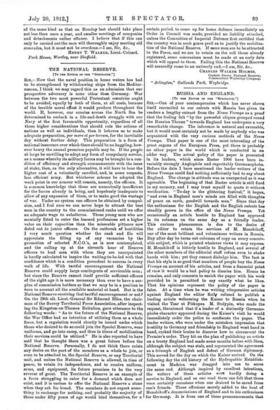RUSSIA AND ENGLAND.
r To THE EDITOR OF THE "SPECTATOR:1 Sin,—One of your contemporaries which has never shown itself reconciled to our entente with Russia has given its readers a lengthy extract from the Novoe Vremya as a proof that the feeling felt "by the powerful cliques grouped round the Russian Throne" towards England has undergone a very remarkable change. The inference is natural and excusable, but it would most certainly not be made by anybody who was acquainted with the very curious methods of the Novoe Vremya. That paper is one of the most interesting of the great organs of the European Press, yet there is probably no other paper in the world which is conducted in an odder way. The actual policy of the paper is presented in its leaders, which since Easter 1906 have been in- variably strongly Anglophile and regrettably Germanophobe. Before the date I have mentioned the leader writers of the Novoe Vremya could find nothing sufficiently bad to say about England. The change in attitude was as unexpected as it was agreeable. The beginning of that Easter article is still fixed in my memory, and I may trust myself to quote it without verification. "To-day is the glittering festival," it began, "and even in England men's minds are filled with thoughts of peace on. earth, goodwill towards men." Since that day the enthusiasm for the English and the English entente has steadily grown in the office of the Novoe Vrem.ya. Yet occasionally an article hostile to England has appeared in its columns on the same day as a friendly leader. This curious phenomenon is due to the desire of the editor to retain the services of M. Menshikoff, one of the most brilliant and voluminous writers in Russia. Day after day he turns out columns of copy on every conceiv- able subject, which is printed whatever views it may express. M. Menshikoff is bitterly hostile to England, and several of the other members of the editorial staff refuse even to shake hands with him; yet they cannot dislodge him. The fact is that his style is so good that numbers of people buy the Nave Vremya on account of his articles, and from a financial point of view it would be a bad policy to dismiss him. Hence he remains, and only consents to enrich the paper with his work provided he is permitted to say exactly what he likes. That his opinions represent the policy of the paper is false. At a time when he was writing vituperative articles against England the editor flatly refused to publish a leading article welcoming the Kaiser to Russia when he visited the Tsar at Pitkopas. M. Stolypin, who made the request, threatened that if a leader of a distinctly Germano- phobe character appeared during the Kaiser's visit he would immediately order the police to confiscate the paper. The leader writers, who were under the mistaken impression that hostility to Germany and friendship to England went hand in hand, racked their brains to discover how to circumvent the Premier's order. They hit on the plan of publishing an article on a treaty England had made some months before with Siam, although the subject was stale, and represented the agreement as a triumph of English and defeat of German diplomacy. This served for the day on which the Kaiser arrived. On the following day the old history of the Ifydropathic Establish- ment in Madeira was dragged into use to serve the same end. Although inspired by excellent intentions, the writers of these articles were hardly doing a service to England, and as one read them one felt that there were certainly occasions when one desired to be saved from one's friends. These effusions merely ulded to the heat of Mensbikoff's denunciations of England and to his enthusiasm for Germany. It is from one of these pronouncements that
your contemporary has quoted under the mistaken idea that it shows a rolte face on the part of the Novae Vremya. The attitude of that paper has not changed, and similar passages from Menshikoff's articles might have been adduced any time during the last five years.—I am, Sir, &c., ROTHAY RETNOLDS.







































 Previous page
Previous page